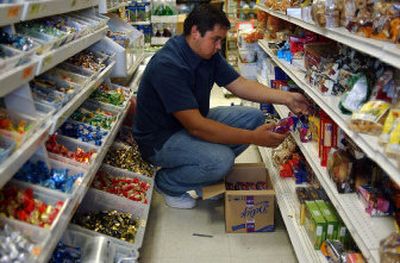Market caters to tastes from many homelands

In the checkout line of Kiev Market, a bicep is flexed, and the Eastern European women lean over their grocery carts and laugh like lunch-bucket matrons who have tasted the salt of their own sweat.
Olga Filenko, the store’s owner, was a crane operator in the Black Sea shipyards of Kerch, Ukraine, an enamelware plant worker in her younger years.
Valentina Korovina, who stands in line with a 10-pound box of mushrooms and enough raw ingredients to feed 10 relatives, was a Russian boilermaker. Korovina is a caretaker now for an elderly woman and mother for a household of six.
“We did men’s work,” says Yelena Ustimenko, the cashier who rings up Korovina’s purchases. Ustimenko made bolts in a Russian factory.
Their English is broken. Sometimes their nouns and verbs align like the zipper of an old coat, but their pride comes through clearly. To build a republic, even one you were forced to flee, is an accomplishment that stays in your hands forever.
The aisles of Kiev Market in Spokane Valley are full of human doings that are done or abruptly reassigned. No matter their vocation in the former Soviet Union, these immigrants show no lingering trace of occupational one-upmanship among them – the old communist regime didn’t tolerate feelings of class superiority. And America has been just as blunt in its leveling of this immigrant society.
Here, pharmacists become newspaper carriers, shipbuilders become tree nursery workers, and boilermakers like Korovina become caretakers for the elderly.
“Our dentists and doctors are janitors here because they cannot speak the English language,” Korovina says.
So, in the market’s aisles, they greet one another like alums at a 20-year class reunion – instead of a 10 – just relieved to recognize someone from the old block. And they fill their carts with the ingredients of their homelands.
“Most of them are just happy to be here and to have jobs,” said Stepan Filenko, the market owner’s son. He stocks cream- and raspberry-filled cookies in a candy aisle three times the size of any treat display in an American supermarket.
There are hard candies for the old Russian men, thumb-sized pieces of filled chocolate for the young. Anything a customer requests, the Filenkos try to order.
The cooler contains 17 kinds of smoked fish; garlic-rich, darkly smoked beef kielbasa for the Serbians who will not eat pork; and chicken paste for the Kyrgyzstan immigrants who, Stepan Filenko says, buy little of anything else.
As the carts line up at the front counter, they are loaded down with 50-pound sacks of flour for baking, 10-pound boxes of mushrooms for marinara, half-gallon jars of whole plum tomatoes for almost everything and bundles of plate-sized sugary wafers for making candy-sweet cakes.
No old-fashioned Eastern European woman worth her salt is ever without the raw ingredients required for feeding three generations of family on short notice or producing a lunch-sized snack for unexpected company.
The Kiev Market’s policy is to open its doors beyond its Monday through Saturday hours of 9 a.m. to 7 p.m. only for emergencies. “Emergencies,” as defined by the market owners, include being caught with an empty pantry by unexpected Sunday visitors.
In the baskets are the ingredients for family, for friendship, for what remains.